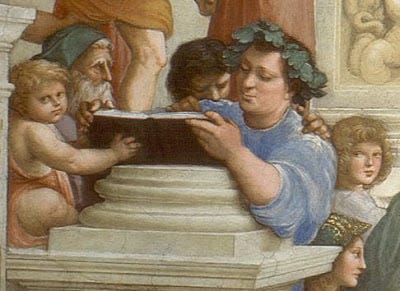Short testimonial by a young brazilian epicureanist
This text is an email sent to EPL (Epicurean Philosophy List).
_
Regarding cities, I have an interesting (if you think) history from myself here in Brazil, and I would be pleased to share it with you guys, and to read yours also.
I lived the longest time of my early childhood in a little country town in Minas Gerais state, during that time the population grew from about 5 thousand to 8 thousand. There, I was indoctrinated as a Catholic, I learnt to appreciate books and nature (my dad owns a medium size farm there, with some cattle, a lake and many fruit trees), and I have fixed friendship ties with the few people who will accompany me (not necessarily in the places I will go but in my heart) to the rest of my days as Metrodorus had accompanied Epicurus.
I believe this small town (named Lagamar) was my Epicurean Garden in the sense of Ethics (the early infancy is quite important to the development of empathy, as Piaget would theorise - I regard empathy as the greater value of Epicurean Ethics).
When I was 10 we (the whole family: me, my parents and my three sisters) moved to a larger town, Patos de Minas (pop. about 120 thousand). There I continued to study nature, particularly Biology of which I was always fond. I continued what I was doing in the early infancy when I used to read encyclopedias for children - to found my personal Epicurean Garden of Materialism. I should not underestimate the impact of my earlier home in the small town, for there I was always in contact with trees, open field, and animals.
However, I was a moralist christian as a child. When I was 11/12 I had my first contact with Darwin's theory of Evolution. I was awed by its simplicity and clearness. Meanwhile, I was getting a higher leap of faith in my first communion (when Catholic children eat the host - the supposed 'body of Christ' - for the first time). I remember dimly that I used to have a 'dual mind' to reconcile science and religion, and I was a sincere believer as a Christian.
When I was 13, I returned to Lagamar (the small town) and there I started to breed a deeper skepticism. I started reading science maganizes for laymen. Then I reached the age of 14, when I was appointed to write a newspaper linked to a group of Catholic teenagers. It was soon after 9/11/2001 that I wrote the first edition. The World Trade Center in NY had crumbled, and in my editorial about it in the first edition of the teen newspaper I was just reluctant to talk about God, any God (in a Christian paper!). I converged to another doctrine of Epicurus': I didn't think the gods cared about us anymore (9/11 was not a cause but a confirmation). Even further than this, I became an atheist (I remember I did this just by exchanging dogmas - I just had faith no god existed - I verbally acknowledged this).
When I was close to 15 years old, I moved again to Patos de Minas, this time without my parents, to live with my sisters and continue my studies in the brazilian equivalent of Highschool.
Empathy and friends played an important role in my life again, as ever since my childhood.
Although an atheist, I had a short (less than 6 months long) flirtation with a meager kind of spiritualism after hearing about NDEs (near-death experiences).
I reached the age of 17 as a skeptic. I didn't believe in gods or in life after death. I had "received" Epicurus' letter to Menoeceus, even though I hadn't read it by the time. But the emotional acceptance of the latter has happened only after I was admitted to University of Brasília (in 2005) and read, in 2006, the Autobiography of Bertrand Russell (I was 19). The Antology of Epicurus has been also an enormous influence, not because I had read it with much attention, but because I met the earlier mind historically registered that shared at large my own views on ethics and knowledge.

In this process, from 2004 to this moment (october 2008) I can't tell exactly when I ceased to be a dogmatic atheist. I recognised I couldn't be a true freethinker while I was commited to any kind of dogma. So I thought it through and decided that in this question, as well as in many others, I should consider the proposition which I didn't share as extremely improbable.
If I consider the gods to be extremely improbable, I don't believe in them, and I call this atheism. I have coined the term Asymptotic Atheism to describe my case, but I could well be called Agnostic Atheist too. I have made a quick research in Philosophy about this sort of reasoning, which I now call Probabilistic Intuition - present in Epicurus, Locke, Hume, Clitomachus, Carneades, even in the stoic Sphaerus, and, most recently, Carl Sagan, Bertrand Russell, Richard Dawkins and Daniel Dennett, among others, seem to share this view (though not all of the cited have applied probabilistic intuition to the existence of gods).
Now I'm 21, two months away from my graduation in Biology, here in Brasília city. What I owe to Epicurus is that I have never felt stronger and happier. It is thanks to him I have some Ataraxia in my mind, unity and honesty in my thought, and awareness of empathy in my trail.
He is not an idol, for I don't need any idols anymore. He is a friend, among others whom I cherish.

